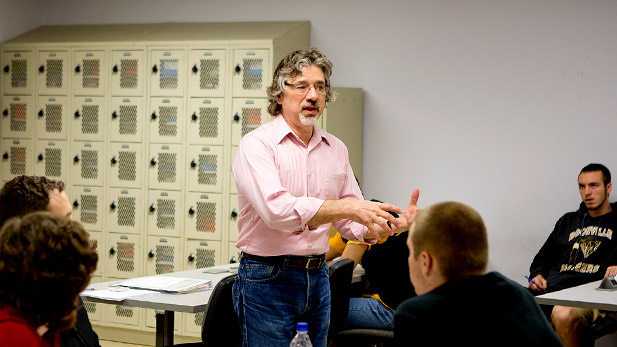Layton Helps Rewrite Mechanical Engineering Education
Friday, May 08, 2020

Mechanical engineering professor Richard Layton has taught classes on introduction to design, data visualization, and the analysis and design of engineering systems during 20 years on the Rose-Hulman faculty.
Richard Layton has been the ultimate team player.
The award-winning mechanical engineering professor joined other U.S. college educators in creating the integrated Team-Maker system to assist the development of teams in engineering courses. Another national scholarly effort examined the intersectionality of sex and race/ethnicity within undergraduate engineering students.
He collaborated with Rose-Hulman mechanical engineering faculty colleagues to evaluate and redesign experimental aspects of the department’s curriculum, based upon research literature on experiential learning.
Layton also worked with fellow institute engineering and humanities faculty members to write “The Engineering Communication Manual” to help engineers develop their technical communication skills.
“Perhaps the most satisfying aspect of my job has been designing educational experiences for our students and working with colleagues to learn from that practice and improve the next iteration. This is what we do,” says Layton as he prepares for retirement after 20 years of teaching at Rose-Hulman. “Collaboration is why the staff and faculty are the stable pulse of the institute.”
In 2013, Layton received the distinguished service award from the American Society of Engineering Education’s Educational Research and Methods Division. Four years earlier he had earned the Premier Award at the Frontiers in Education Conference for excellence in developing engineering education courseware.
And, he has received numerous best paper awards for his scholarly work, with national colleagues. The long list of accolades includes the prestigious Wickenden Award on three occasions from the Journal of Engineering Education (JEE), the latest being in 2019.
“From time to time, I and colleagues would have one of those ‘aha’ moments that led to a particularly good piece of planning or writing in our research,” Layton recalls. “In particular, JEE rejected outright a paper that we later rewrote. We then invited a sociologist to join the team to provide a different viewpoint and rewrote the paper yet again. Not only was it accepted by JEE, but it earned the 2019 Wickenden Award.”
Layton’s areas of expertise and teaching have included introduction of design, data visualization, measurement systems, dynamic systems modeling and simulation, and technical communications.
His final academic quarter has been a challenge as course materials were adapted for the e-learning environment as classes were moved online due to the coronavirus public health crisis.
“I’ve had to remind myself that I won’t be using the new content I’ve created again, so I don’t actually have to take notes on what to improve next time,” Layton says. “The best part of working at Rose-Hulman is the staff, student, and faculty I get to work with. And, as faculty have retired in the past decade, we have been fortunate in our hiring. My new and slightly-used colleagues are doing some great work. I’ll miss working with them.”
The award-winning mechanical engineering professor joined other U.S. college educators in creating the integrated Team-Maker system to assist the development of teams in engineering courses. Another national scholarly effort examined the intersectionality of sex and race/ethnicity within undergraduate engineering students.
He collaborated with Rose-Hulman mechanical engineering faculty colleagues to evaluate and redesign experimental aspects of the department’s curriculum, based upon research literature on experiential learning.
Layton also worked with fellow institute engineering and humanities faculty members to write “The Engineering Communication Manual” to help engineers develop their technical communication skills.
“Perhaps the most satisfying aspect of my job has been designing educational experiences for our students and working with colleagues to learn from that practice and improve the next iteration. This is what we do,” says Layton as he prepares for retirement after 20 years of teaching at Rose-Hulman. “Collaboration is why the staff and faculty are the stable pulse of the institute.”
In 2013, Layton received the distinguished service award from the American Society of Engineering Education’s Educational Research and Methods Division. Four years earlier he had earned the Premier Award at the Frontiers in Education Conference for excellence in developing engineering education courseware.
And, he has received numerous best paper awards for his scholarly work, with national colleagues. The long list of accolades includes the prestigious Wickenden Award on three occasions from the Journal of Engineering Education (JEE), the latest being in 2019.
“From time to time, I and colleagues would have one of those ‘aha’ moments that led to a particularly good piece of planning or writing in our research,” Layton recalls. “In particular, JEE rejected outright a paper that we later rewrote. We then invited a sociologist to join the team to provide a different viewpoint and rewrote the paper yet again. Not only was it accepted by JEE, but it earned the 2019 Wickenden Award.”
Layton’s areas of expertise and teaching have included introduction of design, data visualization, measurement systems, dynamic systems modeling and simulation, and technical communications.
His final academic quarter has been a challenge as course materials were adapted for the e-learning environment as classes were moved online due to the coronavirus public health crisis.
“I’ve had to remind myself that I won’t be using the new content I’ve created again, so I don’t actually have to take notes on what to improve next time,” Layton says. “The best part of working at Rose-Hulman is the staff, student, and faculty I get to work with. And, as faculty have retired in the past decade, we have been fortunate in our hiring. My new and slightly-used colleagues are doing some great work. I’ll miss working with them.”